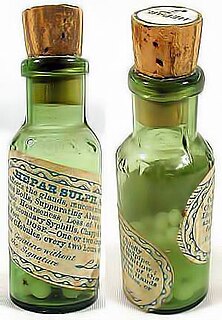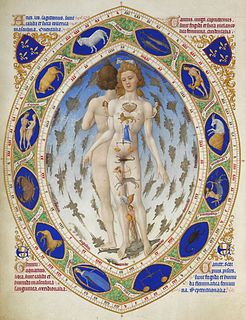Related Research Articles

Faith healing is the practice of prayer and gestures that are believed by some to elicit divine intervention in spiritual and physical healing, especially the Christian practice. Believers assert that the healing of disease and disability can be brought about by religious faith through prayer or other rituals that, according to adherents, can stimulate a divine presence and power. Religious belief in divine intervention does not depend on empirical evidence of an evidence-based outcome achieved via faith healing.

Naturopathy or naturopathic medicine is a form of alternative medicine that employs an array of pseudoscientific practices branded as "natural", "non-invasive", or promoting "self-healing". The ideology and methods of naturopathy are based on vitalism and folk medicine, rather than evidence-based medicine (EBM). Naturopathic practitioners generally recommend against following modern medical practices, including but not limited to medical testing, drugs, vaccinations, and surgery. Instead, naturopathic practice relies on unscientific notions, often leading naturopaths to diagnoses and treatments that have no factual merit.

Christian Science is a set of beliefs and practices belonging to the metaphysical family of new religious movements. It was developed in 19th-century New England by Mary Baker Eddy, who argued in her 1875 book Science and Health that sickness is an illusion that can be corrected by prayer alone. The book became Christian Science's central text, along with the Bible, and by 2001 had sold over nine million copies.
Reiki is a Japanese form of alternative medicine called energy healing. Reiki practitioners use a technique called palm healing or hands-on healing through which a "universal energy" is said to be transferred through the palms of the practitioner to the patient in order to encourage emotional or physical healing.

Medieval medicine in Western Europe was composed of a mixture of pseudoscientific ideas from antiquity. In the Early Middle Ages, following the fall of the Western Roman Empire, standard medical knowledge was based chiefly upon surviving Greek and Roman texts, preserved in monasteries and elsewhere. Medieval medicine is widely misunderstood, thought of as a uniform attitude composed of placing hopes in the church and God to heal all sicknesses, while sickness itself exists as a product of destiny, sin, and astral influences as physical causes. On the other hand, medieval medicine, especially in the second half of the medieval period, became a formal body of theoretical knowledge and was institutionalized in the universities. Medieval medicine attributed illnesses and disease, not to sinful behaviour, but to natural causes, and sin was only connected to illness in a more general sense of the view that disease manifested in humanity as a result of its fallen state from God. Medieval medicine also recognized that illnesses spread from person to person, that certain lifestyles may cause ill health, and some people have a greater predisposition towards bad health than others.
The Grant Government Medical College, Mumbai, is a public medical college, affiliated to the Maharashtra University of Health Sciences. Founded in 1845, it counts among the premier medical institutions in India and one of the oldest institutions teaching medicine in South Asia.
A Christian Science practitioner is an individual who prays for others according to the teachings of Christian Science. Treatment is non-medical and not based on empirical evidence, rather it is based on the Bible and the Christian Science textbook, Science and Health with Key to the Scriptures (1875) by Mary Baker Eddy (1821–1910), who said she discovered Christian Science in 1866 and founded the Christian Science church in 1879. According to the church, Christian Science practitioners address physical conditions, as well as relationship or financial difficulties and any other problem or crisis. Practitioners are either "listed" or "unlisted," a designation that refers to a form of international accreditation maintained by The Mother Church, in Boston, Massachusetts. "Listed" practitioners are included in the directory of Christian Science practitioners on the church website, and printed in the Christian Science Journal. In the United States, Christian Science practitioners are legally defined as health care providers.
A medical intern is a physician in training who has completed medical school and has a medical degree but does not yet have a license to practice medicine unsupervised. Medical education generally ends with a period of practical training similar to internship, but the way the overall program of academic and practical medical training is structured differs depending upon the country, as does the terminology used.
Energy medicine is a branch of alternative medicine based on a pseudo-scientific belief that healers can channel healing energy into a patient and effect positive results. Practitioners use a number of names including various synonyms for medicine and sometimes use the word vibrational instead of or in concert with energy. In no case is any empirically measurable energy involved: the term refers instead to so-called subtle energy.

Fe Villanueva del Mundo,, was a Filipina pediatrician, the founder of the first pediatric hospital in the Philippines. Her pioneering work in pediatrics in the Philippines while in active medical practice spanned eight decades. She gained international recognition, including the Ramon Magsaysay Award for Public Service in 1977. In 1980, she was conferred the rank and title of National Scientist of the Philippines, and in 2010, she was conferred the Order of Lakandula. She was the first female president of the Philippine Pediatric Society and the first woman to be named National Scientist of the Philippines in 1980. She was also the founder and the first president of the Philippine Pediatric Society, the first Asian to be elected president of the Philippine Medical Association in its 65-years existence, and the first Asian to be voted president of the Medical Woman's International Association.
Catherine D. DeAngelis is the first woman and the first pediatrician to become editor of the Journal of the American Medical Association (JAMA). She has also edited several additional medical journals. Before assuming the editor's position at JAMA in 2000, DeAngelis was a professor and Vice Dean of Faculty at the Johns Hopkins School of Medicine.

Loretta C. Ford is an American nurse and the co-founder of the first nurse practitioner program. Along with pediatrician Henry Silver, Ford started the pediatric nurse practitioner program at the University of Colorado in 1965. In 1972, Ford joined the University of Rochester as founding dean of the nursing school.
Edmund F. Burton was an American physician who left medicine for the study of Christian Science. He was licensed to practice in Illinois, Arizona, and California. While still practicing medicine, he was a member of the American Medical Association.
John M. Tutt was an American medical doctor who converted to Christian Science in 1905, later becoming a practitioner in 1912, and then a teacher of Christian Science in 1916. One of his early patients was the mother of film actress Ginger Rogers.
Walton Hubbard was a medical doctor who, after nine years of medical practice, quit medicine for Christian Science. He later became a Christian Science practitioner, teacher and lecturer.
Shantilal Chhaganlal Sheth (1912–1990) was an Indian pediatrician and the president of several medical institutions including the Medical Council of India, the apex body for matters related to medical administration and education in India. An honorary surgeon commander at the Indian Navy, he served as the honorary physician to the President of India. The Government of India awarded him the third highest civilian honour of the Padma Bhushan, in 1972, for his contributions to medicine.
Sarah Kiguli, MBChB, MMed (Pediatrics), MHPE, is a Ugandan pediatrician, academic, and medical researcher. She is a professor and head of the Department of Pediatrics and Child Health at the Makerere University School of Medicine, a component of the Makerere University College of Health Sciences.

Minnie Bodhanwala is an Indian business executive, entrepreneur and a dentist. She is the CEO of Nowrosjee Wadia Maternity Hospital and Bai Jerbai Wadia Hospital for Children in Mumbai. Bodhanwala is a board member and director of several Wadia Group organizations and companies. Her current appointment includes trustee of Sir Ness Wadia Foundation and advisor to the Chairman for CSR and Modern Education society.
Bernadette J. Mazurek Melnyk is an American nurse. She is a professor of pediatrics and psychiatry at Ohio State University College of Medicine and dean of the College of Nursing. Melnyk is also the editor in chief of the journal Worldviews on Evidence Based Nursing.
References
- 1 2 3 4 5 Madelon Maupin Holland, "An interview: Why I left the medical profession for Christian Science" Christian Science Journal (April 1980). Retrieved 17 June.
- ↑ Dr. Jer Master, Biographical intro to "Prayer and Your Child's Health" Guide to Child Care. Retrieved 17 June 2013
- 1 2 "Dispelling illusion through spiritual truth" Archived 31 January 2015 at the Wayback Machine Deccan Herald (18 March 2004). Retrieved 17 June 2013
- ↑ Lalitha Sridhar (April 2005) Medicine in the Mantra. Life Positive.